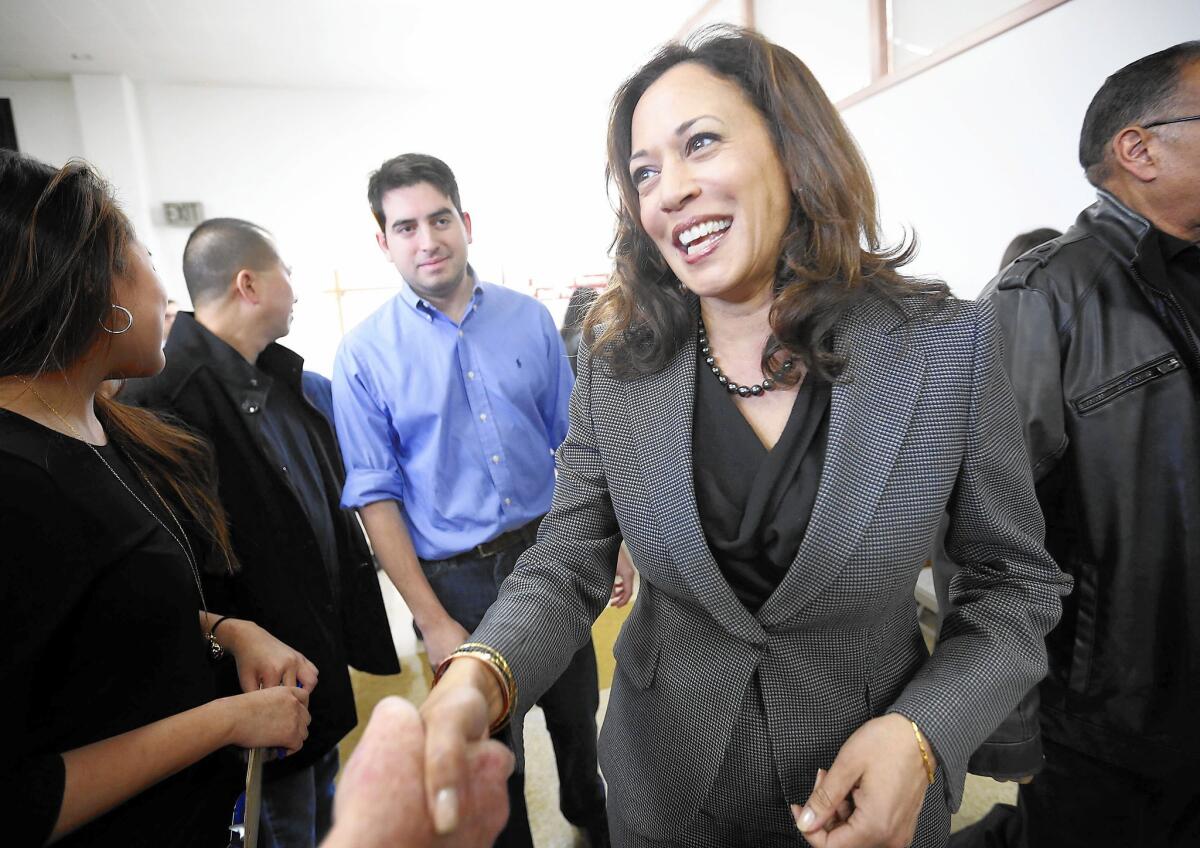Kamala Harris should take bolder action on police shootings, civil rights advocates say

Reporting from reporting from SACRAMENTO — Amid continuing tensions over the fatal police shootings of black men across the nation, some civil rights activists and members of California’s Legislative Black Caucus say state Atty. Gen. Kamala Harris must do more to increase accountability and ensure impartial investigations.
Of primary concern is Harris’ opposition to legislation that would require her office to independently investigate fatal police shootings. Harris also has stopped short of endorsing statewide regulations on the use of police body cameras, saying that she believes all officers should wear them but that local agencies are best equipped to enact policies.
“Her absence is noticeable,” said Sen. Holly Mitchell (D-Los Angeles), a member of the black caucus. “People are looking to her for guidance and direction.”
The scrutiny is especially intense because Harris, the daughter of immigrants from Jamaica and India, is a woman of color and the top law enforcement official in California.
“She looks like me,” Mitchell said. “So it gets complicated.”
Harris, a U.S. Senate candidate, said she agrees that more needs to be done. But under her leadership, she argued, California has made significant strides in dealing with bias in the criminal justice system.
The attorney general cited new statewide police training procedures to combat racial and ethnic bias and the creation of a website and other policies that provide unprecedented transparency about in-custody deaths, arrest rates and citizen complaints against law enforcement.
“There is no question that we need to have changes in the system so that there is greater fairness,” Harris said. “That is a lot of the work that we have been doing.”
Some of her political allies, however, think she has been too cautious.
Assemblyman Kevin McCarty (D-Sacramento) — who like Mitchell is backing Harris’ Senate candidacy — said he was disappointed last year when the attorney general did not support legislation that would require the Department of Justice to investigate deadly police shootings.
There is growing skepticism, he said, about whether local prosecutors can impartially investigate officers with whom they often work closely.
Connecticut and Wisconsin have laws requiring independent investigations of civilian deaths by police. And after the death of Eric Garner in New York, Gov. Andrew M. Cuomo in July enabled his state’s attorney general to serve as a special prosecutor.
“The African American and civil rights community have been disappointed that [Harris] hasn’t come out stronger on this,” said McCarty, who is also a member of the black caucus. “I hope that she sees this is a nuanced approach and makes sense.”
Eric Rose, a public affairs expert in Los Angeles, said it’s important to remember that Harris comes from a law enforcement background.
A former Alameda County prosecutor and district attorney in San Francisco, Harris has been smart about using that cachet to address concerns about racial bias and police accountability without “turning into a lightning rod for either side,” Rose said.
“She hasn’t backtracked on her beliefs. She hasn’t switched positions,” he said. “She’s a true liberal, but she’s been smart about finding the right issues to talk about that would not alienate the law enforcement community.”
The most recent flash point came last month, with the release of a video showing the fatal shooting of Mario Woods, 26, by San Francisco police.
Some community activists have demanded the resignation of Chief Greg Suhr, who said his officers fired in defense of themselves and bystanders, and they have called on Harris to launch an independent inquiry. But the attorney general said she was confident that San Francisco Dist. Atty. George Gascón would conduct a fair and thorough investigation.
Similar calls were heard after the death of Ezell Ford, an unarmed, mentally ill black man who was shot and killed by Los Angeles police in 2014. Police said Ford had tackled one of the officers and tried to take his gun. The case is still under review by the Los Angeles County district attorney’s office.
Harris said her office does have the authority to intervene in cases, but will do so only if there is evidence of impropriety or an abuse of discretion by local prosecutors. She has worked diligently to court law enforcement, and her Senate bid has been endorsed by the Los Angeles Police Protective League — which represents LAPD officers — the California Statewide Law Enforcement Assn. and the Oakland Police Officers Assn., among others.
McCarty’s bill to require the state to investigate fatal police shootings, as well as the body camera legislation, was opposed by law enforcement representatives and failed to pass in 2015. Both issues are expected to be reconsidered by lawmakers this year.
Melina Abdullah, a professor of Pan-African Studies at Cal State L.A. and an active member of the Black Lives Matter movement, said of Harris: “This is not the time for timidity. ... Martin Luther King said if you tell black people to wait, that means never.”
But Abdullah praised the attorney general for increasing transparency on police conduct through the Open Justice website. It provides the public with data on arrest rates, in-custody and arrest-related deaths and law enforcement officers killed or assaulted — breaking the numbers down by race and ethnicity, cause of death and other factors.
Natasha Minsker of the American Civil Liberties Union of California called Harris’ push for increased transparency “a very good sign.” But she wants that effort expanded to include records about specific cases, not just aggregated data.
“Records exist that document police misconduct that the public is not allowed to see,” Minsker said. “California has the most secretive laws in the nation.”
She noted that Harris has the authority to launch civil rights investigations when there is evidence of wrongdoing not only by prosecutors but also by law enforcement.
For example, then-Atty. Gen. Bill Lockyer launched a civil rights inquiry after the 1998 shooting death of Tyisha Miller by four Riverside Police Department officers.
Miller, a 19-year-old black woman, was killed by officers who saw her passed out in a car with a gun on her lap. The investigation revealed widespread civil rights violations by police and concluded that the department had failed to uniformly enforce the law. As a result, the agency was under state oversight for five years.
David Beltran, spokesman for the state attorney general’s office, said the agency has not closed any civil rights enforcement cases in five years under Harris but was “keeping a close eye on a variety of matters.”
Lateefah Simon, an advocate for criminal justice reform with the Rosenberg Foundation in San Francisco, said that Harris has devoted her legal career to ensuring Californians are treated justly and fairly.
“No politician can stroke a wand and create magic,” said Simon, whom Harris recruited to work with her at the San Francisco district attorney’s office.
“If I did not believe that she had the clearest and most profound intentions of getting to the bottom of this [police use-of-force] epidemic, I would be outside with a bullhorn.”
Twitter: @pwillon
ALSO
Column: 14 years in, Brown shows no sign of losing political muscle
Explosion risk stalls plan to capture and burn gas from Porter Ranch leak
Amount of lobbying done in the shadows is growing, California ethics officials agree
More to Read
Sign up for Essential California
The most important California stories and recommendations in your inbox every morning.
You may occasionally receive promotional content from the Los Angeles Times.











